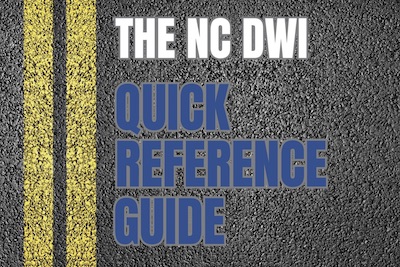Felony Drug Crimes: Common Terms
 If you’ve been arrested and face drug charges in Charlotte, it helps to understand some of the basic terms defense attorneys, judges, and prosecutors use in court to explain the allegations.
If you’ve been arrested and face drug charges in Charlotte, it helps to understand some of the basic terms defense attorneys, judges, and prosecutors use in court to explain the allegations.
The “common terms” are in addition to the different “Schedules” of drug offenses, from minor Schedule VI possession of marijuana charges all the way up to Schedule I trafficking charges.
Defense lawyers and other legal professionals also use “terms of art” to explain both statutory and constitutional legal issues.
Possess or Possession: Possession of a controlled substance can be related to actual possession of a drug. That differs from the legal concept of “constructive possession.”
Constructive Possession is often fact-specific and somewhat unique to allegations. Intent is relevant consideration. It is generally defined as “dominion, control, or authority” over the controlled substance, showing the accused intended to possess the drug. Constructive possession may be proven by both direct and circumstantial evidence. Even if the controlled substance is not on your physical person, the State may attempt to prove you “constructively possessed” the controlled substance. Criminal lawyers may ask things like:
- a. Did you have the drugs on your person?
- b. Were the drugs near you?
- c. Could you reach the drugs if you tried?
- d. Did police observe you “throw down” the drugs or attempt to hide the controlled substance?
- e. Where were the drugs found?
- f. Were the drugs found on your property, somewhere you lived, or a room you stay in?
- g. What forms of Identification were found near the drugs?
- h. Did the police observe a “hand-to-hand" exchange of drugs?
Actual Possession: Possession of a controlled substance on your person. Did you have a controlled substance in your hand, in a pocket, clothing, wallet, purse, or bag? Did you know you had the controlled substance on your person? Did you intend to possess the drug? Lawful possession of a controlled substance pursuant to a prescription generally would not be a legal basis for criminal charges involving allegations of possession charges.
Knowingly: Did you know about the drugs? Were you aware what was going on? “Knowing” relates back to intent and willful conduct. Did you intentionally and purposely do something or was there is mistake? Intent is an important element of drug crimes involving transporting drugs, trafficking, possession, sale, deliver, and manufacturing charges.
Sale: The sale of drugs has to do with exchanging a controlled substance for something of value. It does not necessarily need to be money. Sale of a drug includes consideration of whether there is an actual transfer of the controlled substance.
Manufacture: Manufacturing drugs is a felony drug charge in North Carolina. The State bears the Burden of Proof to show the accused (the Defendant in criminal charges) compounds, propagates, produces, converts, prepares a controlled substance by any means. The manufacture of controlled substances may come about if the Defendant engages or assists to produce, propagate, prepare, convert, or process the controlled substance or package or repackages the drug, the label, or relabeling of the container. Certain medical professionals, pharmacists, doctors, and other medical service providers may are not subject to the law, if acting within the scope of their profession.
Deliver: Delivery can involve either the constructive transfer (inferred from the facts and circumstances of the alleged drug offense) or the actual transfer of drugs to another person. Did the accused knowingly, intentionally, and willfully exchange, deliver, or transfer a controlled substance?
Transport: Transporting drugs means to take, carry, and/or move a controlled substances from one place to another. Transporting controlled substances, while related, is a separate criminal charge than Trafficking in Controlled Substances.
PWISD: Possession with Intent to Sell or Deliver controlled substances.
Trafficking: Possession of a Controlled Substance over a certain statutory amount or dosage unit. Intent to distribute is not an essential element of trafficking charges in North Carolina. One must only possess a controlled substance at or above the amount set forth by the North Carolina General Assembly. Trafficking charges also do not take into consideration the existence or non-existence of a prior criminal history or record.
- Can I fight my charges?
- What is Drug Trafficking?
- What is a Criminal Summons?
- Are cases Indicted in Charlotte?
 Our team of criminal defense lawyers in Charlotte provide experienced, focused legal representation to clients.
Our team of criminal defense lawyers in Charlotte provide experienced, focused legal representation to clients.
Our legal consultations for criminal charges are complementary. We do not charge consultation fees for criminal offenses.
"Clients are regularly charged with more than one offense for the same general conduct. We see multiple count indictments for both felony and misdemeanor charges."
- Bill Powers
If you Googled, “Criminal Lawyers near me,” we may be able to help.
We provide legal representation for serious felony drug crimes in Charlotte and the surrounding judicial districts including:
- Union County NC – Monroe, Waxhaw
- Iredell County – Mooresville, Statesville
- Rowan County – Salisbury
- Gaston County – Gastonia, Cherryville, Belmont
Call today 704-342-4357 to schedule a phone conference, secure video conference, or office visit.
You may also email Attorney Bill Powers at Bill@CarolinaAttorneys.com
Helpful Information About Criminal Charges Powers Law Firm PA Home
Powers Law Firm PA Home



















